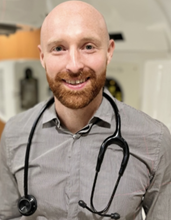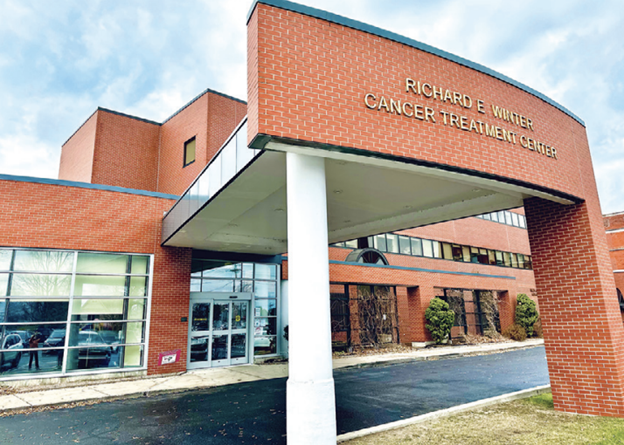Raising Awareness: Testicular, Esophageal, and Head and Neck Cancers
- Category: CHMC News, Health & Wellness
- Posted On:

April marks a significant month for cancer awareness, shining a spotlight on three lesser-known but equally critical forms: Testicular Cancer, Esophageal Cancer, and Head and Neck Cancer. As we delve into each of these, it's essential to understand their signs and symptoms, empowering individuals with knowledge for early detection and prevention.
Testicular Cancer
Testicular cancer primarily affects young and middle-aged men, making awareness crucial for this demographic. While it's relatively rare compared to other cancers, its incidence has been steadily rising. Recognizing the signs early can lead to successful treatment outcomes.
“Testicular cancer is the most common cancer diagnosed in men aged 20-40 years old. While it is a highly treatable and curable malignancy it is prudent for young men to seek medical attention when concerning symptoms such as an enlarged painless testicular mass is noted.” - David Boyce, MD, Chief of Radiation Oncology Claxton-Hepburn Medical Center
Testicular Cancer by the Numbers
- Incidence: Approximately 1% of all cancers in men.
- Lifetime Risk: About 0.4%, or 1 in 250 men, will be diagnosed with Testicular Cancer during their lifetime.
- Age Distribution: Most commonly diagnosed in young and middle-aged men, with the highest incidence occurring between the ages of 15 and 35.
Signs and Symptoms
- Lump or swelling: A painless lump or swelling in one of the testicles is the most common symptom.
- Pain or discomfort: Discomfort, heaviness, or pain in the testicle or scrotum may indicate a problem.
- Changes in size or shape: Any noticeable changes in the size, shape, or consistency of the testicles should be examined by a healthcare professional.
Early detection through self-examinations and routine check-ups is key to managing testicular cancer effectively. Regular screenings, along with prompt medical attention for any abnormalities or concerns, can greatly increase the chances of successful treatment and long-term survival for individuals diagnosed with this type of cancer.
Esophageal Cancer
Esophageal cancer develops in the esophagus, the tube that carries food from the throat to the stomach. It's often diagnosed at an advanced stage due to a lack of early symptoms, highlighting the importance of awareness and cancer screening.
Esophageal Cancer by the Numbers
- Incidence: Accounts for approximately 1% of all cancers diagnosed worldwide.
- Lifetime Risk: The lifetime risk of developing Esophageal Cancer is around 0.5%, or 1 in 200 individuals.
- Age Distribution: More common in older adults, with the majority of cases diagnosed in individuals over the age of 50.
Signs and Symptoms
- Difficulty swallowing: Persistent difficulty or pain while swallowing solid foods or liquids.
- Unintended weight loss: Significant and unexplained weight loss over a short period.
- Persistent heartburn or indigestion: Chronic heartburn, acid reflux, or indigestion that doesn't improve with medication.
Esophageal cancer can be aggressive, but early diagnosis can significantly improve treatment outcomes. Paying attention to these symptoms and seeking medical advice promptly is crucial. Additionally, individuals with a history of chronic acid reflux or Barrett's esophagus should undergo regular cancer screenings to detect any potential abnormalities early on, allowing for timely intervention and improved prognosis.
Head and Neck Cancer
Head and neck cancer encompasses various cancers that occur in the mouth, throat, nose, sinuses, salivary glands, and other areas. While tobacco and alcohol use are significant risk factors, the Human Papillomavirus (HPV) infection has also been linked to an increased risk of certain types of Head & Neck Cancers.
“Head and neck cancers are amongst some of the most aggressive and fast growing malignancies we see. With that being said, they are also one of the most preventable cancers as they are heavily associated with modifiable/lifestyle risk factors including smoking, chewing tobacco, alcohol use and infection with the HPV virus. It is important for our community to take measures to mitigate these risk factors by promoting smoking and alcohol cessation, and encouraging HPV vaccination.” - David Boyce, MD, Chief of Radiation Oncology Claxton-Hepburn Medical Center
Head and Neck Cancer by the Numbers
- Incidence: Represents about 4% of all cancers in the United States.
- Lifetime Risk: The lifetime risk varies depending on the specific type of Head & Neck Cancer and other risk factors but is generally around 1% to 2%.
- Age Distribution: Can occur at any age but is most frequently diagnosed in individuals over the age of 50, particularly in those who use tobacco or alcohol or have been exposed to HPV.
Signs and Symptoms
- Persistent sore throat: A sore throat that doesn't go away, or a feeling of something lodged in the throat.
- Lump or swelling: A lump or swelling in the neck that lasts for more than two weeks.
- Difficulty breathing or speaking: Persistent hoarseness, difficulty speaking, or changes in voice quality.
- Ear pain: Unexplained pain in one ear that persists for more than a few days.
Early detection of head and neck cancer can lead to more effective treatment options and better outcomes. Regular dental check-ups and awareness of potential symptoms are crucial for early diagnosis. Additionally, individuals who smoke or use tobacco products should undergo thorough oral examinations as part of their routine healthcare, as these habits significantly increase the risk of developing head and neck cancers.
Discover Excellence in Cancer Care at the Richard E. Winter Cancer Center

Located in Ogdensburg at CHMC, the Richard E. Winter Cancer Center is nationally recognized for its comprehensive care and accredited by esteemed organizations like the Commission on Cancer of the American College of Surgeons (CoC) and the American College of Oncology Pharmacy (ACOC).
Our center offers advanced treatments including radiation oncology with the Trilogy linear accelerator and medical oncology services, ensuring patients receive cutting-edge therapies close to home. With a commitment to personalized care and holistic well-being, our comprehensive services include cancer screenings, breast cancer services, and holistic care options like massage therapy and acupuncture.
We're thrilled to welcome Dr. Robert S. Davidson, a skilled surgical oncologist, to our team. His expertise further enhances our mission to provide excellence in cancer care with compassion and proficiency. Additionally, Dr. Daniel Kyung, an experienced physician specializing in Hematology and Medical Oncology, and David Boyce, MD, our esteemed Chief of Radiation Oncology, contribute significantly to our comprehensive approach to patient care. Working together, they form a dynamic team dedicated to providing comprehensive and compassionate care, ensuring that each patient receives personalized treatment tailored to their specific needs.
If you are concerned about cancer or simply looking to learn more about our center, contact us at 315.393.2314 or visit our website for more information.


.jpg)
